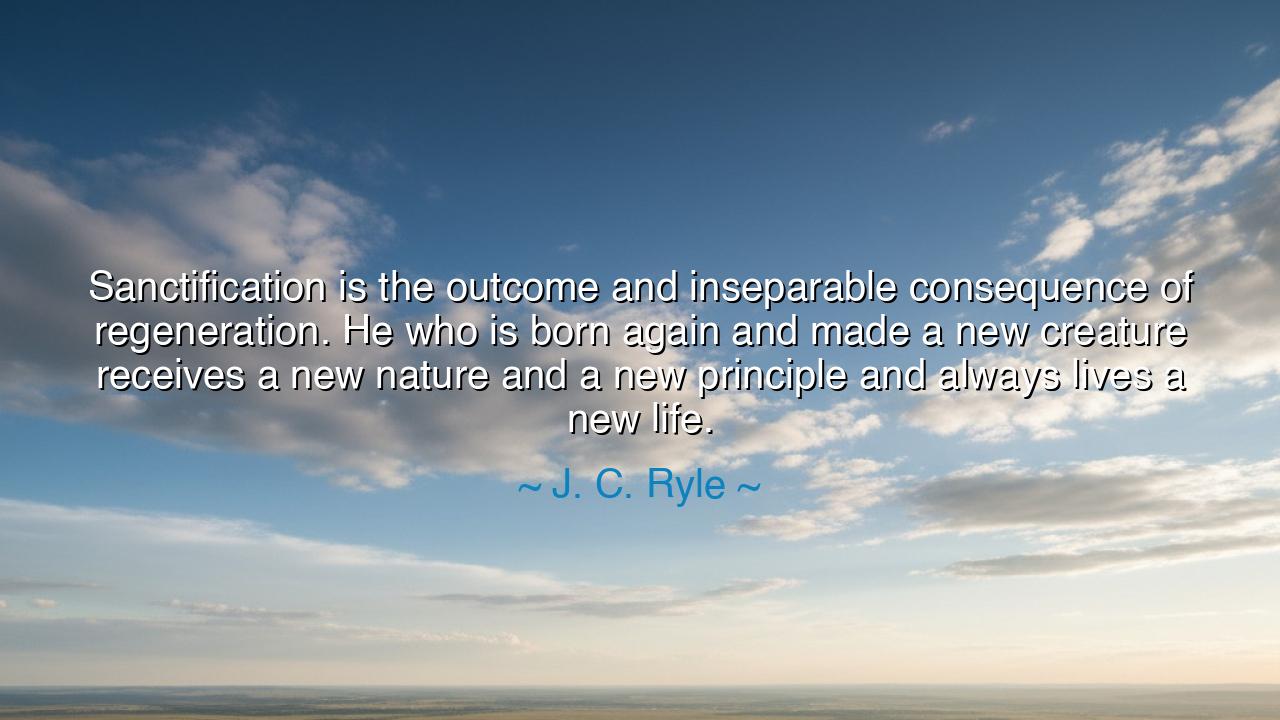
Sanctification is the outcome and inseparable consequence of
Sanctification is the outcome and inseparable consequence of regeneration. He who is born again and made a new creature receives a new nature and a new principle and always lives a new life.






J. C. Ryle, the great bishop of the nineteenth century, proclaimed: “Sanctification is the outcome and inseparable consequence of regeneration. He who is born again and made a new creature receives a new nature and a new principle and always lives a new life.” In this solemn saying lies the wisdom of the ages, a truth not bound by time or place, but written in the very fabric of the soul. Ryle reminds us that the work of the spirit is not partial, nor does it leave a man as it found him. Regeneration is no mere outward change, no fleeting impression; it is the death of the old and the rising of the new. From that fountain flows sanctification, the holy transformation that follows as day follows dawn.
The origin of these words is rooted in the Christian tradition, where the mystery of being “born again” signifies a renewal wrought by the divine. To Ryle, the moment of new birth is not an end, but a beginning. Just as the seed, once planted, must push upward into green life, so too the soul, once touched by regeneration, cannot help but grow in holiness. The teaching is clear: sanctification is not optional; it is the natural outworking of the living principle implanted by God Himself. A new nature cannot long wear the garments of the old.
This is no abstract philosophy. History testifies to it in flesh and blood. Consider the life of Augustine of Hippo. Once a man of indulgence and worldly passions, he pursued lust, power, and empty pleasures. But when regeneration seized his heart, when the voice of God called him in the garden, Augustine arose as a new creature. From that hour, his life bore the marks of sanctification. His writings, his devotion, his ceaseless battle against his old nature—all bore witness that the man who is born again indeed “receives a new nature and a new principle.” Augustine did not remain what he was; he was transformed into a vessel of truth whose influence echoes through centuries.
The imagery of Ryle’s words is heroic and eternal. To be born again is to step from the tomb of darkness into the light of the morning sun. It is the metamorphosis of the caterpillar into the butterfly, the lifeless stone turned into beating heart. And sanctification—this continual growth in holiness—is the journey of the butterfly in flight, the heart learning to beat in rhythm with eternity. The two cannot be severed; where there is true regeneration, sanctification must follow, just as flame follows the spark.
The lesson is not only for saints of old, but for us. Many claim the name of renewal, yet live as though no transformation has occurred. But Ryle’s words pierce this hypocrisy: if one is truly a new creature, his life must bear the fruit of holiness. It is not enough to profess change; one must live it. To say “I am born again” without the marks of sanctification is to plant a seed and expect a harvest without growth. The genuine soul, however, cannot resist the work of grace; he is compelled to walk a new life, even when stumbling, even when struggling, for the power within drives him onward.
From this, practical wisdom arises: examine your life as a mirror. Do you see the old nature reigning, or do you see a slow, steady shaping into something higher? Begin with small actions—resist bitterness when it arises, choose truth over convenience, extend mercy when anger tempts you. These are not trifles; they are signs of sanctification, living proof that regeneration is alive in the soul. Attend to the inward life as carefully as a gardener tends his vineyard, for weeds grow quickly, but fruit requires watchfulness.
Thus the teaching of Ryle endures: sanctification is inseparable from regeneration. Do not be content with the seed alone; seek the fruit. Do not boast of new birth while clinging to old chains; rise and walk as one reborn. For the true life is not in words, but in transformation. The one who is born again is called to live a new life—not once, not briefly, but daily, until his days are done. And in this lifelong sanctification, the soul finds its true dignity, its true destiny, and its true union with the divine.






AAdministratorAdministrator
Welcome, honored guests. Please leave a comment, we will respond soon